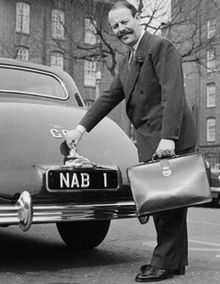Gerald Nabarro
| Sir Gerald David Nunes Nabarro | |
|---|---|
 | |
| Nabarro with his car, NAB 1 | |
| Member of Parliament for Kidderminster | |
| In office February 23, 1950 – October 15, 1964 | |
| Preceded by | Louis Tolley |
| Succeeded by | Tatton Brinton |
| Member of Parliament for South Worcestershire | |
| In office March 31, 1966 – November 18, 1973 | |
| Preceded by | Peter Agnew |
| Succeeded by | Michael Spicer |
| Personal details | |
| Born | June 29, 1913 Willesden Green |
| Died | 18 November 1973 (aged 60) Broadway, Gloucestershire |
| Nationality | British |
| Political party | Conservative |
Sir Gerald David Nunes Nabarro (29 June 1913 – 18 November 1973) was a British businessman and latterly Conservative Party politician of the 1950s and 1960s.
Early life
Nabarro was born in Willesden Green, the son of an unsuccessful shopkeeper. He was born to a prominent Sephardi Jewish family[1] but later converted to Christianity.[2]
Career
Nabarro left school at 14, and ran away from home into the Merchant Navy, and then joined the British Army, rising to the rank of sergeant. Having served his time, he was honourably discharged in the mid-1930s, and went into the timber-supply industry, where he made his fortune. At the start of World War 2, he rejoined the Army as an officer.[3]
Political career
At the 1945 general election, Nabarro stood as the Conservative candidate in the Labour-held West Bromwich constituency. The seat was comfortably held by Labour's John Dugdale, with a swing on 18.6%,[4] much higher than the national average of 10%.[5]
In the general election of 1950, Nabarro was elected as Member of Parliament (MP) for Kidderminster, Worcestershire which he held until 1964. He then retired on health grounds.
Given a clean bill of health, he was selected as Conservative candidate for the safer constituency of South Worcestershire, neighbouring his old constituency, after the previous MP, Sir Peter Agnew, had retired. He duly won the seat in the 1966 general election, and represented it until he died in office in November 1973. No by-election was held after his death; the seat was still vacant when Parliament was dissolved on 8 February 1974 for the general election later that month.[5]
Style
Nabarro characterised himself as an old-style Tory: he opposed entry to what is now the European Union, was a proponent of capital punishment, and supported Enoch Powell following the latter's controversial "Rivers of Blood" speech. Even five years earlier, on 5 April 1963, while appearing on Any Questions?, he said "How would you feel if your daughter wanted to marry a big buck nigger with the prospect of coffee-coloured grandchildren?", remarks which were excised from a repeat of the programme the following week.[6]
Despite humble beginning, he was an incarnate Tory-toff, sporting a Jimmy Edwards-style handlebar moustache, a booming baritone voice, and a fruity Terry-Thomas accent. He enjoyed driving, and owned the personalised number plates NAB 1 through 10, which he attached to his large garage of Rolls-Royce and Bentley cars.[3]
Later years
On the night of 21 May 1971, Nabarro's car NAB 1 was seen to swerve at speed the wrong way round a roundabout at Totton, Hampshire. It was occupied by Nabarro and his company secretary, Margaret Mason. The police charged him as the driver, but Nabarro insisted it was his secretary, who agreed with his story. Found guilty by a jury at Winchester Crown Court, the judge pronounced his behaviour "outrageous" and fined him £250. Announcing his appeal on the court steps immediately afterwards, accompanied by his private secretary Christine Holman, he suffered two strokes in the following year. Cleared in the second trial, many commentators of the time believed that the jury had brought in their verdict to spare Nabarro the horrors of a perjury trial.[3]
Resigning his seat on health grounds a few months later, he died at his home in Broadway, Gloucestershire on 18 November 1973.[3]
Notes
- ↑ Dictionary of National Biography
- ↑ Guardian, Saturday October 23, 1999
- ↑ 3.0 3.1 3.2 3.3 http://www.theguardian.com/uk/1999/dec/27/hamiltonvalfayed.features11
- ↑ Craig, F. W. S. (1983) [1969]. British parliamentary election results 1918-1949 (3rd edition ed.). Chichester: Parliamentary Research Services. p. 257. ISBN 0-900178-06-X.
- ↑ 5.0 5.1 Craig, F. W. S. (1981) [1968]. British Electoral Facts 1832-1980 (4th edition ed.). Chichester: Parliamentary Research Services. pp. 99, 154. ISBN 0-900178-20-5.
- ↑ Donald Thomas, Freedom's Frontier: Censorship in Modern Britain. John Murray, 2007 ISBN 071955733X (p.317)
External links
- Hansard 1803–2005: contributions in Parliament by Gerald Nabarro
- Nabarro is mocked on the cover of Private Eye
- Critical article from The Guardian
- Portraits of Gerald Nabarro at the National Portrait Gallery, London
| Parliament of the United Kingdom | ||
|---|---|---|
| Preceded by Louis Tolley |
Member of Parliament for Kidderminster 1950–1964 |
Succeeded by Tatton Brinton |
| Preceded by Peter Agnew |
Member of Parliament for South Worcestershire 1966–1973 |
Succeeded by Michael Spicer |
|